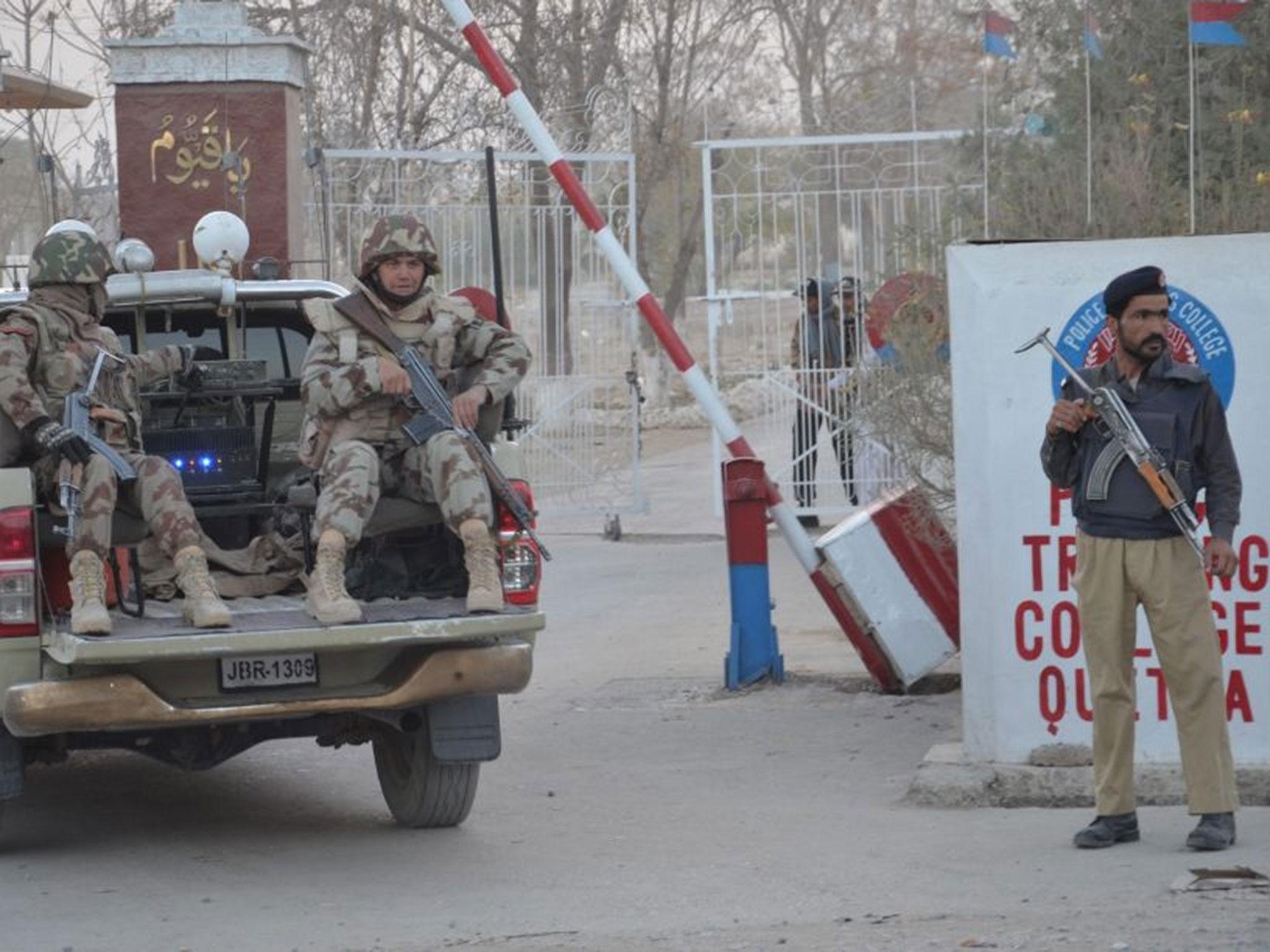Quetta attack: Isis claims attack on Pakistan police academy that killed 61
Militants wearing suicide vests stormed a police academy overnight, killing mostly cadets and recruits

Your support helps us to tell the story
From reproductive rights to climate change to Big Tech, The Independent is on the ground when the story is developing. Whether it's investigating the financials of Elon Musk's pro-Trump PAC or producing our latest documentary, 'The A Word', which shines a light on the American women fighting for reproductive rights, we know how important it is to parse out the facts from the messaging.
At such a critical moment in US history, we need reporters on the ground. Your donation allows us to keep sending journalists to speak to both sides of the story.
The Independent is trusted by Americans across the entire political spectrum. And unlike many other quality news outlets, we choose not to lock Americans out of our reporting and analysis with paywalls. We believe quality journalism should be available to everyone, paid for by those who can afford it.
Your support makes all the difference.Isis has claimed responsibility for an attack on a police academy in the Pakistan city of Quetta, in which masked gunmen killed at least 61 people and wounded more than 100.
The group's Amaq news agency said three Isis fighters “used machine guns and grenades, then blew up their explosive vests in the crowd”. It also published a photo claiming to show the attackers.
Militants wearing suicide vests stormed the police academy overnight, killing mostly police cadets and recruits and waging a ferocious gun battle with troops until the early hours of Tuesday.
Pakistani officials feared the death toll could rise further, as the four-hour siege – one of the deadliest attacks on Pakistan’s security forces in recent years – left 123 other people injured, some of them in a critical condition.
The attack caught many of the recruits asleep in their dorms and forced cadets and trainers to jump off rooftops and run for their lives.
While most of the casualties were police cadets and others at the academy, some of the army personnel who responded to the assault were also among those killed, said Shahzada Farhat, police spokesman in Quetta, the capital of Balochistan province.
A little-known breakaway faction of the Pakistani Taliban, known as the Hakimullah group, also issued a statement claiming responsibility for the attack.
Pakistani authorities, doubting the group’s capabilities in staging such a coordinated and spectacular assault, could not confirm the claim.
The attack began at 11.30pm local time on Monday, said Balochistan home minister Sarfraz Bugti, with the militants shooting and killing a police guard at the watch tower before storming into the academy, located on the outskirts of Quetta.
“Two attackers blew up themselves, while a third one was shot in the head by security men,” Mr Bugti said. Earlier, officials had said there were five to six gunmen.
About 700 cadets, trainees, instructors and other staff were inside the academy when it was attacked, Mr Bugti said.
Once inside the academy grounds, Pakistani media said the gunmen headed straight to the dorms housing the cadets and trainees and opened fire, shooting indiscriminately. Some of the cadets jumped off the rooftops and through windows to try to escape.
“They were rushing toward our building, firing,” one cadet told Geo TV, a Pakistani news channel. “We rushed for safety toward the roof and jumped down in the back of the building.”
Another recruit, his face covered in blood, told the station the gunmen fired at whoever they saw. “I ran away, just praying God might save me,” he said.
After the attack, Pakistani forces tightened security around the academy and hospitals where the wounded were taken.
Major General Sher Afgan, head of the Pakistani paramilitary force which is primarily responsible for the province, claimed the attackers had received instructions from commanders in neighbouring Afghanistan.
He said they were most likely from the banned Lashkar-e-Jhangvi Al-Alami militant group affiliated with al-Qaida and the Taliban. The Sunni militant group has mainly targeted minority Shia Muslims whom its members consider to be infidels. The paramilitary chief spoke before the Isis and Hakimullah group claims surfaced.
In August, Isis claimed responsibility for an attack on a gathering of mourners at a hospital in Quetta that killed 70 people. But that attack was also claimed by Pakistani Taliban faction Jamaat-ur-Ahrar.
Additional reporting by agencies
Join our commenting forum
Join thought-provoking conversations, follow other Independent readers and see their replies
Comments